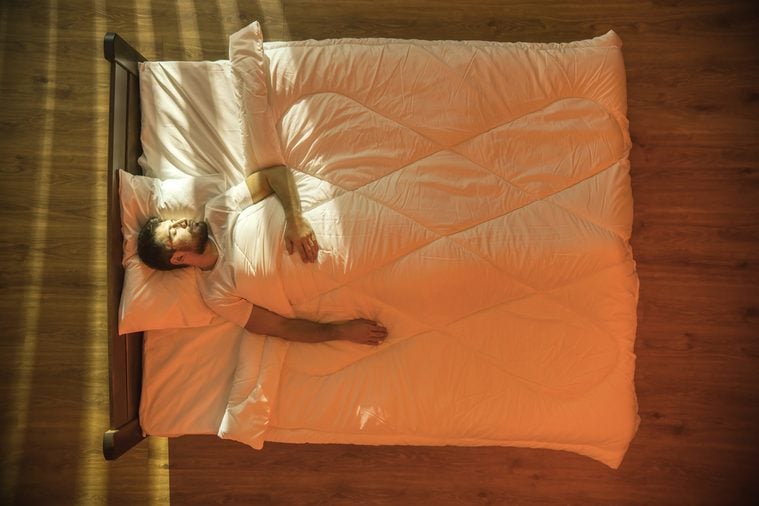The Serious Reason You Need to Sleep in the Dark
Updated: Jun. 15, 2023
If you tend to spend half of the night in the living room, drifting in and out of sleep in front of the TV, you really need to read this.

It’s no surprise not getting a proper night’s rest can really mess with your health. But you might not realize that your sleep habits can have a huge impact on your long-term wellbeing. A study out of Northwestern University revealed that having a light on while sleeping can raise your risk of diabetes.
These 4 Sleep Behaviors Can Help You Live Longer, Says New Research
For the study—published in the journal Sleep—researchers recruited 20 healthy adult volunteers (ages 18 to 40). The volunteers spent two nights and three days at the lab: The first night, they slept in pitch black darkness; the second night, half of them slept in the dark again while the other half slept in a room with a bright overhead light on. While the volunteers slept, the researchers tracked the volunteers’ vital signs, brain wave activity, and leg and eye movements. They also took hourly blood samples to measure melatonin—a vital hormone that helps control your internal clock (circadian rhythm) and typically rises during sleep. In the morning, the researchers conducted glucose tolerance tests on the volunteers.
Remarkably, just sleeping under a bright light drove up insulin resistance—a risk factor for diabetes. When insulin can’t do its job, the body struggles to process sugar. “Our preliminary findings show that a single night of light exposure during sleep acutely impacts measures of insulin resistance,” said lead author Ivy Cheung Mason, PhD, a postdoctoral fellow at Northwestern’s Feinberg School of Medicine (at the time of the study), in a press release.
This Natural Sweetener May Lower Cholesterol and Blood Sugar, New Study Says
Previous research has linked poor sleep to a higher risk of depression, breast cancer and prostate cancer. Now we can add metabolic diseases such as diabetes to the list: “Sleep disturbances affect more than 25 percent of the general population and up to 50% of older adults… Improving sleep in adults at risk for heart disease, stroke, and diabetes represents a much needed and novel approach to the prevention and treatment of epidemics of type 2 diabetes and obesity, as well as improve the quality of life of those suffering from sleep disturbances.”
Although this is preliminary research, it does support the idea that you should avoid falling asleep on the couch and spending part—or most—of the night with the lights on and the TV blaring.
- I Tried Valerian Root To Help Me Sleep for a Week—Here’s What Happened
- Can’t Sleep? A Metabolism Scientist Says This Is the #1 Solution for Sleepless Nights
- Here’s What Happens If You Don’t Change Your Socks, According to a Doctor
- Over 50? Using the Internet for This Long Each Day Could Reduce Dementia Risk, Says New Study
